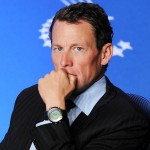 This week sees the widesread release of The Armstrong Lie, the movie about former cyclist and drug cheat Lance Armstrong. As a cyclist, the story of Armstrong is unfortunately a very familiar one. The movie however begins back in 2009 when Armstrong, still widely lauded for his comeback from cancer to win the Tour de France seven times, returned to the sport after his retirement in 2007.
This week sees the widesread release of The Armstrong Lie, the movie about former cyclist and drug cheat Lance Armstrong. As a cyclist, the story of Armstrong is unfortunately a very familiar one. The movie however begins back in 2009 when Armstrong, still widely lauded for his comeback from cancer to win the Tour de France seven times, returned to the sport after his retirement in 2007.
Filmmaker Alex Gibney’s documentary style project was then canned in the wake of the expose of Armstrong over the past year, only to be rejigged and turned into its current incarnation.
Central to the story of course is the interview Armstrong conducted via the Oprah Winfrey show earlier this year, where he finally admitted to the numerous charges laid against him of doping and cheating his way to all seven of his Tour victories.
No doubt that performance was carefully designed and stage managed by Armstrong and his representatives to deal with the fallout of former team mate Tyler Hamilton in his book The Secret Race, which led to formal investigations into Armstrong by US Anti Doping.
The researchers looked at 859 tweets made by Armstrong during 2012 and 2013 and compared them with the comments he made during the interview with Winfrey.
The research found that Armstrong utilized similar tactics on Twitter as during his time in the pro peleton: attacking the accuser, bolstering and stonewalling.
It was only when he was put in front of Winfrey did his tone chance, demonstrating contrition, shifting blame, denial, provocation, victimization, conforming and retrospective regret.
“With respect to athletes, when image repair becomes necessary, digital and social media also afford them the capability to introduce alternative narratives and redirect audiences,” the researchers continued. “Athletes now have the opportunity to promote their charitable endeavors and diligence during workouts and practices, which may shift the public’s attention away from the situation that prompted image repair.”
Alas of course, Armstrong flipped wildly between his position on Twitter and that taken during the tv interview, thus casting extreme doubt over the truthfulness of anything he shared in future, regardless of the medium chosen.
“Given the immense public outpouring and the ability to navigate between identity positions using Twitter, Armstrong could have maintained both an assertive and remorseful position that likely would have removed doubt and skepticism among his fans and the public at large,” the researchers concluded. “Instead, Armstrong minimized the effectiveness of future messages delivered via Twitter, as skeptical followers may view his tweets as little more than propaganda rather than insightful information and commentary.”
So the moral of the story seems to be that, just as with the rather non-interesting research by Microsoft, the key to Twitter is to just be a decent person that shares interesting things.
Odious man.
That is why reputation management is such a thriving industry these days. The idea is to flood the internet with good news about the athlete or celebrity or brand so that the bad news is a thing of the past and floats to the lowest ebb! But it's a treacherous web we weave when we practice deceit! Sooner or later, your true nature is going to show up. So as you pointed out the best thing to be is a decent person!
Kinda what most celebs do isn't it? I suspect it's rare for many of their social accounts to actually be run by them vs a PR agency of some kind.
At the end of the day, social media is big amplifier. If you are a kind and genuine person in real life, it will usually show and transpire into your blog and social media. On the other hand, if someone's a bully-in-denial like Armstrong, a dumb-ass in real life… then that someone will be a bigger dumb-ass on Twitter and other social media. Quite a simple formula, really,
Cheers Adi,
Frederic
Reminds me of that old New Yorker cartoon. The one where the dog is saying to his chum that online no one knows you're a dog. Do you think social has torn down those walls?
Don't know if social has torn down those walls… I think it did, in some shape, but it also created new walls, behind which some people like to hide anonymously, so not sure we're all better off, eh?
Cheers,
FG
Horrible man, and his Oprah 'performance' was utterly nauseating.
To be honest, it surprised me given how much money he has, and how much is at stake here, that he even did his own Twitter account. You'd think that would be professionally managed to within an inch of its life.
Everyone's true colors eventually come out and it's just a shame that Lance wasn't one of those good ones. When you lie, cheat and bully it will come back to bite you and everyone will have that person pegged.
I don't wish him any ill harm but I have no respect for the man at all.
People can mask it anyway they want but the truth always shines.
~Adrienne
Well, what should we expect from such men? Twitter or Facebook, doesn't matter, they will eventually show off their true character.